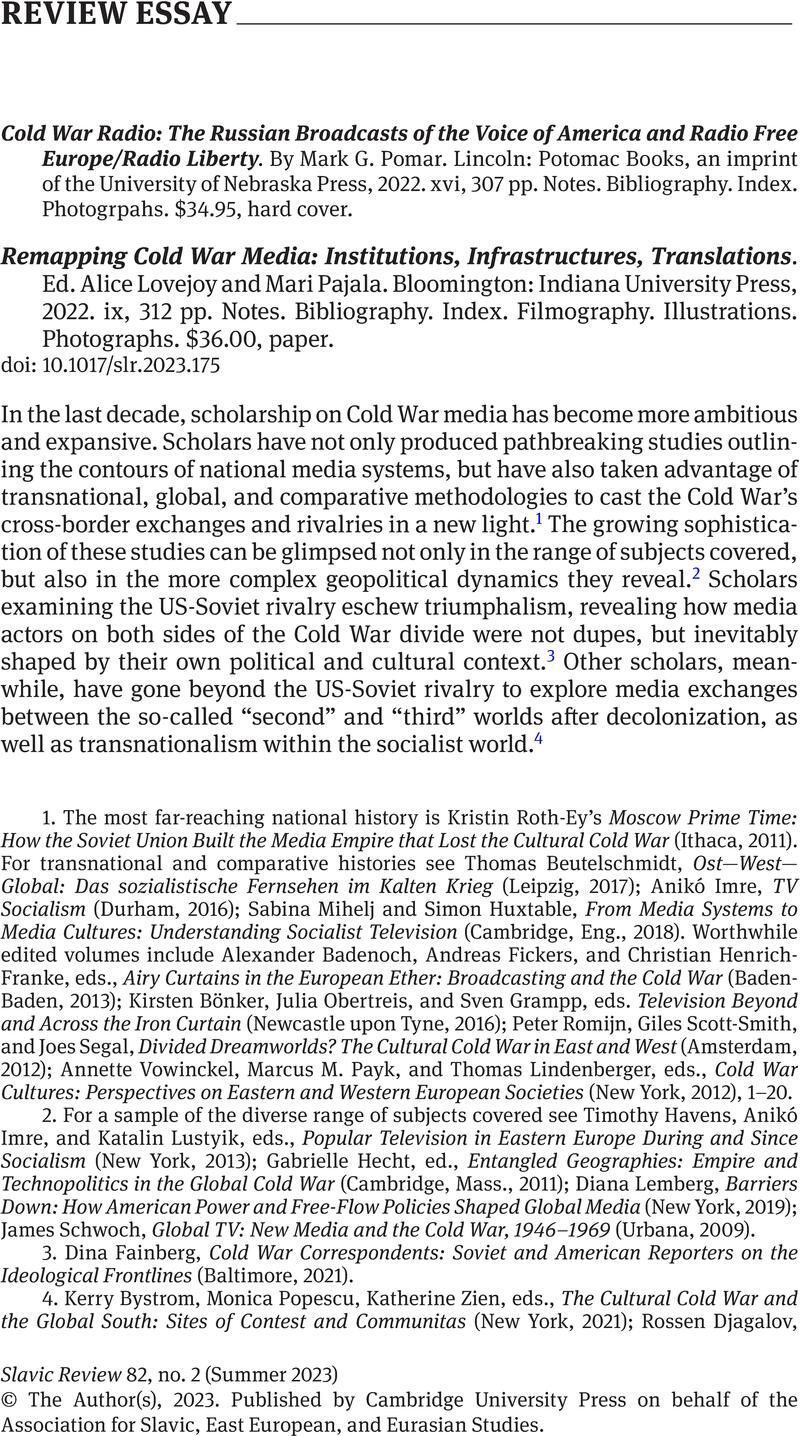No CrossRef data available.
Published online by Cambridge University Press: 01 November 2023

1 The most far-reaching national history is Kristin Roth-Ey’s Moscow Prime Time: How the Soviet Union Built the Media Empire that Lost the Cultural Cold War (Ithaca, 2011). For transnational and comparative histories see Beutelschmidt, Thomas, Ost—West—Global: Das sozialistische Fernsehen im Kalten Krieg (Leipzig, 2017)Google Scholar; Imre, Anikó, TV Socialism (Durham, 2016)Google Scholar; Mihelj, Sabina and Huxtable, Simon, From Media Systems to Media Cultures: Understanding Socialist Television (Cambridge, Eng., 2018)CrossRefGoogle Scholar. Worthwhile edited volumes include Alexander Badenoch, Andreas Fickers, and Christian Henrich-Franke, eds., Airy Curtains in the European Ether: Broadcasting and the Cold War (Baden-Baden, 2013); Bönker, Kirsten, Obertreis, Julia, and Grampp, Sven, eds. Television Beyond and Across the Iron Curtain (Newcastle upon Tyne, 2016)Google Scholar; Romijn, Peter, Scott-Smith, Giles, and Segal, Joes, Divided Dreamworlds? The Cultural Cold War in East and West (Amsterdam, 2012)Google Scholar; Vowinckel, Annette, Payk, Marcus M., and Lindenberger, Thomas, eds., Cold War Cultures: Perspectives on Eastern and Western European Societies (New York, 2012), 1–20Google Scholar.
2 For a sample of the diverse range of subjects covered see Havens, Timothy, Imre, Anikó, and Lustyik, Katalin, eds., Popular Television in Eastern Europe During and Since Socialism (New York, 2013)Google Scholar; Hecht, Gabrielle, ed., Entangled Geographies: Empire and Technopolitics in the Global Cold War (Cambridge, Mass., 2011)CrossRefGoogle Scholar; Lemberg, Diana, Barriers Down: How American Power and Free-Flow Policies Shaped Global Media (New York, 2019)CrossRefGoogle Scholar; Schwoch, James, Global TV: New Media and the Cold War, 1946–1969 (Urbana, 2009)Google Scholar.
3 Dina Fainberg, Cold War Correspondents: Soviet and American Reporters on the Ideological Frontlines (Baltimore, 2021).
4 Kerry Bystrom, Monica Popescu, Katherine Zien, eds., The Cultural Cold War and the Global South: Sites of Contest and Communitas (New York, 2021); Rossen Djagalov, From Internationalism to Postcolonialism: Literature and Cinema between the Second and the Third World (Montreal, 2020); Mihelj & Huxtable, From Media Systems, 177–204.
5 Richard H. Cummings, Radio Free Europe’s “Crusade for Freedom”: Rallying Americans Behind Cold War Broadcasting, 1950–1960 (Jefferson, NC, 2010); A. Ross Johnson, Radio Free Europe and Radio Liberty: The CIA Years and Beyond (Washington, DC, 2010); A. Ross Johnson and R. Eugene Parta, eds., Cold War Broadcasting: Impact on the Soviet Union and Eastern Europe, A Collection of Studies and Documents (Budapest, 2010); Michael Nelson, War of the Black Heavens: The Battles of Western Broadcasting in the Cold War (Syracuse, 1997); Puddington, Broadcasting Freedom.
6 Arch Puddington, Broadcasting Freedom: The Cold War Triumph of Radio Free Europe and Radio Liberty (Lexington, KY, 2003), 288–95.
7 However, see Henrik K. Bastiansen and Rolf Werenskjold, eds., The Nordic Media and the Cold War (Göteborg, 2015).
8 James Mark, Bogdan Iacob, Tobias Rupprecht, and Ljubica Spaskovska, 1989: A Global History of Eastern Europe (Cambridge, Eng., 2019), 125–72.
9 Łukasz Stanek, Architecture in Global Socialism: Eastern Europe, West Africa, and the Middle East in the Cold War (Princeton, 2020), 29–30.